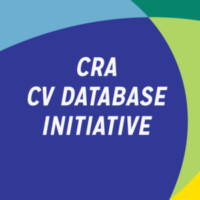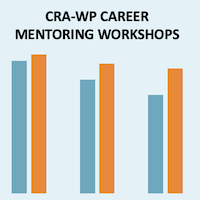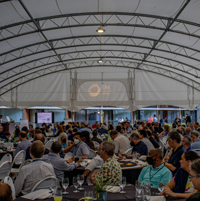
New CRA Board Member Appointed; CRA-Deans Group Elects New Leadership
CRA would like to welcome two new members to its Board of Directors: Raquel Hill (Spelman College) and Eunice E. Santos (University of Illinois).

Archive of articles published in the 2022 issue.

CRA would like to welcome two new members to its Board of Directors: Raquel Hill (Spelman College) and Eunice E. Santos (University of Illinois).

As a first step to address recruiting challenges in the computing research community, the Computing Research Association (CRA) launched the CV Database initiative in Fall 2018. This initiative provides a database of candidates for academic and industrial/government laboratory research positions, and it is searchable by most CRA member institutions.
The CV Database is accessed at https://cra.org/cv-database/. Recruiters are actively using the database, so please encourage all of your PhD students who are actively looking for academic or industrial/government laboratory research positions to post their applications. To obtain the highest benefit, we encourage students post their CV by November 1st (latest).
The National Science Foundation announced a series of grants as a part of their new Predictive Intelligence for Pandemic Prevention (PIPP) program. The quick onset, mass devastation, and unpredictability of new strands and waves of contagion with COVID-19 taught us just how unprepared we were to face a global pandemic. Nearly $26 million in new awards will be used to support “high-risk, high-payoff convergent research that aims to identify, model, predict, track and mitigate the effects of future pandemics.”

Ian Foster, former Computing Community Consortium (CCC) Council Member and Professor at the University of Chicago and Division Director at Argonne National Laboratory, was recently named the 2022 Ken Kennedy award recipient. Presented by the Association for Computing Machinery (ACM) and the Institute of Electrical and Electronics Engineers Computer Society (IEEE-CS) the Ken Kennedy Award is an annual honor recognizing contributions to programmability and productivity in computing and community service or mentoring contributions.
Transformative advancements in Artificial Intelligence (AI) and technology require large amounts of accurate, comprehensive data. There is a widening disparity between the types and amounts of datasets that organizations have access to. This not only hinders research, but widens the knowledge gap between entities. A commonly talked about solution is developing an open source knowledge structure that will be available to everyone and house a wide diversity of data to help address pressing issues such as economic growth, climate change, misinformation, pandemic prevention etc. Last week the National Science Foundation (NSF) released an “Open Knowledge Network Roadmap Report” as a guide towards realizing this type of infrastructure.
On November 10, 2022 from 12-3pm EST, the Computing Community Consortium is hosting a virtual workshop sponsored by the National Science Foundation’s Convergence Accelerator program. This workshop will be the second of a two-part workshop series titled, Building Resilience to Climate Driven Extreme Events with Computing Innovations: A Convergence Accelerator Workshop, the first of which will be held in-person.

This Q&A highlight features Ben Jacobsen, an Honorable Mention in the 2021 CRA Outstanding Undergraduate Researchers award program. Ben graduated from the University of Arizona and is now a Computer Science Ph.D. student at the University of Wisconsin – Madison.

Career Mentoring Workshops are designed to support individuals in early and mid-career stages. Evaluation results indicate that after the workshop, as compared to before the workshop, participants were more likely to report they knew people to whom they could go to for guidance on how to advance their career.
The Distributed REsearch Apprenticeships for Master’s (DREAM) is a pilot NSF program being offered by a nationwide consortium of colleges and universities that have created “bridge to MS in CS” programs for students with non-CS bachelor’s degrees. Schools in the MSCS Pathways to Computing Consortium provide a new pathway for people who studied something other than CS as undergraduates to enter the tech field. The strong emphasis of this effort is to provide a new pathway into computing for individuals from populations historically minoritized in tech (women, LGBQTIA, Black/African American, Hispanic/Latino, Native American/Hawaiian/Alaskan/Asian Pacific Islander students, and students with disabilities). Consortium members sign a membership agreement that, among other things, confirms their commitment to increasing the diversity of their graduate programs. Students in these Consortium pathways come from a wide array of undergraduate backgrounds that span the STEM disciplines, humanities, social sciences, business, and the arts.

One of the goals I hope to accomplish with this article is to open the eyes of faculty to the ways in which bright and motivated undergraduates can contribute meaningfully to their research projects and groups. This piece intends to help educate folks who have limited experience with undergraduate research or are unsure how to come up with research projects. I hope it helps others learn quickly from the knowledge I have gained over the years.

The 2022 CRA Conference at Snowbird provided an excellent opportunity to hear directly from our membership on a number of topics. With CRA’s new strategic plan and new Executive Director, the 2022 CRA Conference was a good time to pause and think about how we might improve. CRA learned from our members that there is a desire for more communication and involvement in agenda setting, increased transparency about our processes, and interest in re-evaluating the Board structure. Thank you for all the thoughtful ideas shared at CRA’s flagship conference! This column provides a summary of the input received, and then concludes with “What’s Next?”.
This website uses cookies so that we can provide you with the best user experience possible. Cookie information is stored in your browser and performs functions such as recognising you when you return to our website and helping our team to understand which sections of the website you find most interesting and useful. You can adjust all of your cookie settings.
